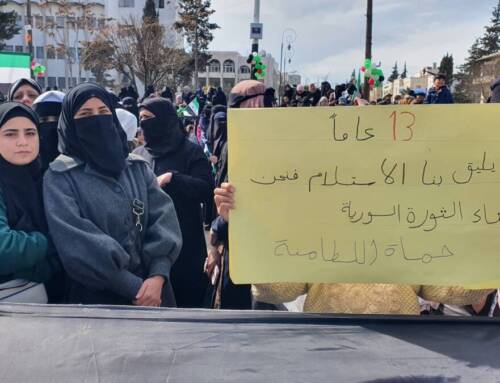SNC member: Regime ‘is pursuing a military solution’
February 17, 2014 The second round of the Geneva II […]
17 February 2014
February 17, 2014

Last week, 49 armed groups aligned with the moderate Free Syrian Army (FSA) announced that they would unite under one banner, calling themselves the “Southern Front.” Meanwhile, Syrian National Coalition chief Ahmad Jarba visited Syria’s northwestern Idlib Province to meet with the leadership of the FSA-affiliated Syrian Revolutionaries Front, in an apparent bid to strengthen the Coalition’s presence inside Syria. The moves coincide with an increase in support from Western and Arab backers: Saudi Arabia has reportedly agreed to supply rebels with antiaircraft missiles, while the United States has stepped up its financial support, providing millions of dollars to pay soldiers’ salaries.
Samir Nashar is a member of the opposition Syrian National Coalition. He tells Syria Direct’s Mohammad al-Haj Ali that the umbrella group should henceforth pursue “stronger communication and cooperation” among the different rebel fronts, including the Islamic Front and Jaish al-Mujahideen, among others.
Only a military threat will force the regime to back down, Nashar says, “as was the case with the chemical weapons deal.”
Q: What comes next for the Syrian opposition after the second round of Geneva II ended without results?
I think that the Syrian opposition needs to work in two ways. First, it needs to reorganize its internal affairs, especially given the rifts among the opposition following the [Coalition’s] decision to participate in Geneva II. Second, it needs to rethink its political positions and priorities, given the failed experience at the conference. It therefore needs to expand the conversation in two ways.
It needs to develop the opposition’s strength outside of the Coalition among rebels, and build stronger communication and cooperation among the different rebel fronts irrespective of their affiliations, i.e. the Islamic Front, Jaish al-Mujahideen, Ajnad a-Sham, the Syrian Revolutionaries Front and even the military brigades and councils. There needs to be a political consensus and a unified vision about the Geneva conference.
Moreover, the Coalition needs to widen the conversation to include the Friends of Syria group and show them that the regime is not at all serious about finding a political solution that guarantees Syria’s transition from a corrupt dictatorship led by Bashar al-Assad to a civil democratic state.
I believe that the Coalition needs to convince the Friends of Syria that now is the time to provide Syrian rebels with anti-tank and anti-aircraft weaponry in order to shift the balance of power on the ground. This is vital given that the regime has tried to do the same during Geneva II by using airstrikes and barrel bombs on Syrian cities, especially Homs, and is now trying to take over Yabroud and displace tens of thousands of Syrian citizens in an attempt to extend its rule over liberated territories in Qalamoun.
A recent photograph from the Qalamoun town of Yabroud. Photo courtesy of An-Nahar.net.
This means that the Syrian regime is pursuing a military solution. On the other hand, the Coalition and the opposition must send a strong, clear message to the Friends of Syria saying that they must provide a variety of weapons that can stop the regime’s attacks and shift the balance of power. We know from experience that the regime will not make any political concessions unless it is under military threat, as was the case with the chemical weapons deal that worked in favor of the Syrian people.
Q: Reports have emerged that the Syrian National Coalition is considering moving its headquarters from Istanbul to Cairo. What are you thoughts on this?
If that is true, I think we need to carefully consider the matter and understand the reasons behind the decision, especially considering that communication over the Syrian-Turkish borders is not only logistically essential, but also critical in providing aid for the Syrian people and supporting revolutionary forces along the Turkish border.
I think moving to Cairo will make communication with Syria even more difficult. Not only because of the current political turmoil in Cairo, but because there is no shared border between Egypt and Syria. The distance between the two countries will present serious burdens on Syrian activists who are constantly gong back-and-forth between Syria and will lead to serious obstacles that will not help the Syrian revolution.
I believe that Turkey is the appropriate headquarters for the opposition and the coalition.
For more from Syria Direct, like us on Facebook or follow us on Twitter.








